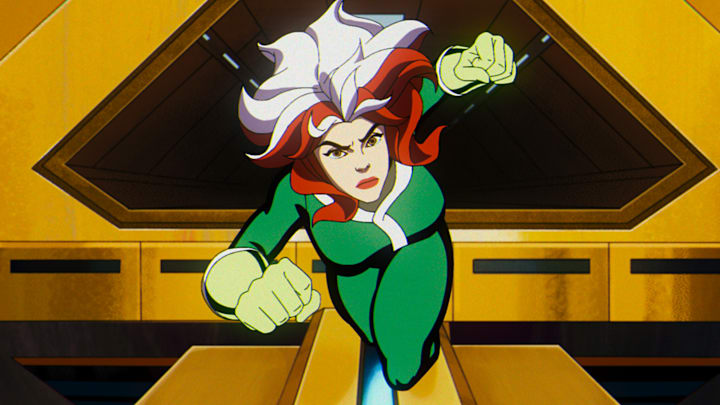For the mutants in the Marvel Universe, the “X” once represented hope and unity. Two lines, crossing together. Inspired by the dream of Charles Xavier of mutantkind and mankind coexisting, the X-Men reinforced this, incorporating the letter into their name as if to say “We will protect the futures of man and mutant alike, no compromise.”
It was a hopeful dream, born of good and evil ideas that represented parallels to our world, such as the fight for civil rights. This was no more apparent than how Xavier and rival Magneto compared to real-life civil rights leaders such as Martin Luther King Jr and Malcolm X.
But this is a different time. This is a different era.
A divided future for the X-Men
Following the end of the Krakoa era of X-Men comics, this "Raid on Graymalkin" storyline within the “From the Ashes” crossover splits the team based on two clashing opinions on what Xavier’s dream represented. There’s a problem, however; this dream is tainted by the very man behind it and the betrayal of his team. Aligning with the anti-mutant group Orchis, he spat in the face of all who he imbued into his merry band of mutants.
In the wake of his actions, Rogue and Cyclops are left to pick up the pieces as they lead their teams in 2024’s Uncanny X-Men and X-Men titles, written by Gail Simone and Jed Mackay respectively. Yet, there’s a problem: they have different approaches to picking those pieces up. Despite this, they have the same goal: Rescue Charles Xavier from Dr. Corrina Ellis’s clutches in Graymalkin Prison.
For Cyclops, he’s been raised to embody the teachings of Xavier so much so that it’s in his soul. Scott Summers. A boy scout, a soldier, a born leader. He plays the long game and has a tactical mind with the patience to see his ruby-quartz-tinted vision through. Fans of the Disney+ animated series X-Men '97 will notice that he takes this burden upon himself as though it’s his god-given duty, but his god turned his back on him. His team is indicative of his militaristic upbringing, as a task force rather than the team it was.

Rogue, however, marches to the beat of her drum. Dictated by emotions, which she feels deeply, Rogue is in the same mind space many of the X-Men on her side are in. She leads loners who, after hesitation, hope to personify the hope that mutants had for Xavier’s dream, rather than the dream itself. This empathetic attitude imbues her group of mutants with a sense of family. Rogue guides her team with immediate action without compromising their morals.
While Cyclops leads from the bitter cold of Alaska and Rogue helms her team in the Cajun haven of Louisiana, they are equally distanced in their worldviews.
How they fight for this dream and the man behind it is informed by their philosophies on it — Cyclops opts for what the dream is, whereas Rogue aims for what the dream represents. Just as man instills society with grand ideas, others can take them and shape their meaning out of it from their cognitive biases. These biases then spread to others and the community grows from it. The further these communities separate, the more antagonistic they become, increasing the likelihood of volatility and dissent.
With the upcoming election, the partisan opposition between Rogue and Cyclops doesn’t feel too dissimilar to how political dissension permeates society. In the United States, the pavement of this country’s ideals was built on the ideas of its Founding Fathers— flawed men with flawed ideals, some of which were done with noble intentions.

In historian Joseph J Ellis’s interview with Time’s Lucas Wittman in “A Historian’s Take on What the Founding Fathers Got Wrong”, much of America’s early leaders had an elitist view, looking down on other cultures and races yet many American citizens look up to them for how they led the country through its establishment of independence.
The clash of red and blue, Republican and Democrat, right and left, cause the distance based on ideologies. They mix like oil and water. What could be purple, united, and the middle are instead isolated islands. Each side, grasping for its heroes and villains – digging themselves deeper until firmly planted as though a sturdy tree rooted deeply.
Throwing any political stance aside, I’ve seen the dichotomy increase in width between the perspectives of those who subscribe to either side becoming a litmus test to decipher which side is right based on one’s reaction to the environment, morals, and society.
And so, the “X” doesn’t represent two lines joining together, instead, they clash. Neither will give way until one side pushes past the other. All that stands between the forces of said lines is how far one side will push past the other. All for the idea of one man who shifted his allegiances.
If they knew not Xavier, then most of us never knew Benjamin Franklin who had staunchly supported slavery in the United States, only for him to become an abolitionist near the end of his life, having written and signed his Petition from the Pennsylvania Society for the Abolition of Slavery.
Akin to Xavier’s previous approach of unity contrasted to Magneto’s former mentality of seeing missions through by any means necessary, Cyclops and Rogue’s goals differ in more modern sensibilities. What it “is” against what it “should be”.
To feature these long-standing characters as new “pillars,” Marvel is plotting a course for characters that read as intentionally flawed, making decisions based on the ideals of a flawed man instead of collectively paving their own new path for mutantkind makes this interesting.
Handled under the writing direction of Jed Mackay’s X-Men and Gail Simone’s Uncanny X-Men, it’s curious how both writers handle this complicated yet entertaining story.
